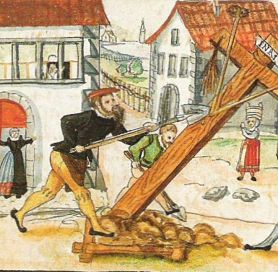371. European Disunion: Introduction to the Reformation
How humanism and scholasticism came together with the Protestant Reformation to create the philosophy of 15 - 16th century Europe.
Themes:
• J. Bossy, Christianity in the West: 1400-1700 (Oxford: 1985).
• H. Lagerlund (ed.), Routledge Companion to Sixteenth Century Philosophy (London: 2017).
• A.E. McGrath, Reformation Thought: An Introduction (Oxford: 1988).
• C.G. Nauert, Humanism and the Culture of Renaissance Europe (Cambridge: 2006).
• C.G. Nauert, “Humanism as Method: Roots of Conflict with the Scholastics,” Sixteenth Century Journal 29 (1998), 427-38.
• H.A. Oberman, Forerunners of the Reformation: The Shape of Medieval Thought Illustrated by Key Documents (Philadelphia: 1981).
• A.R. Perreiah, “Humanist Critiques of Scholastic Dialectic,” Sixteenth Century Journal 13 (1982), 3-22.
• R. Po-chia Hsia (ed.), A Companion to the Reformation World (Malden: 2004).
• E. Rummel, The Humanist-Scholastic Debate in the Renaissance and Reformation (Cambridge, MA: 1995).






Comments
Continuous Story of Build Ups and New Directions
"The phrase 'Without Any Gaps' means, above all, one last thing: That I will not be skipping from highlight to highlight the way a lot of university courses on history of philosophy have to do, where one jumps straight from, say, Aristotle to Descartes, leaving out a couple of thousand years in between. Rather, I want to tell a continuous story, so you can see how each thinker builds on those that came earlier, but also strikes out in new directions."
Is this goal still the above all intent of Without Any Gaps? If it is, what approach do you intend to take to maintain it as being a continuous story in a geographical format? And if you need to give context from earlier figures you hadn't covered yet, how you will do so in a way that still allows us to see how they build upon yet strikes out in a new direction? Especially in a way that is superior to just trying to give context before a greatest hits type overture.
In reply to Continuous Story of Build Ups and New Directions by Alexander Johnson
"Without any gaps" in the modern period
Yes, those are all problems I have been pondering already and will need to wrestle with, going forward. One caveat will have to be that the sheer amount of material and number of figures makes truly gap-free coverage completely impossible (if it was ever possible): I mean, to discuss every philosopher who lived in 18th century France would probably take me twenty years. But the idea is more to get across a textured and fairly complete picture of all the significant trends and developments in each place and time, rather than just hopping from one major person to the next. So I might be mentioning lots of "minor" figures but more to use them as examples, than with the ambition of covering everyone of comparable stature. As for continuity, I was thinking that geography makes that slightly easier because it prevents me from jumping all over Europe which I think could be really confusing; I don't think it is too bad if, when discussing e.g. Rousseau, I need to refer to some British philosophers but only sketchily to give needed background, and then I come back to those same philosophers in full detail later on. And I suppose that this would happen no matter how I organize the material, since so much happens more or less simultaneously.
Reformation Timeline thinkers
This was a good introduction episode Peter, could you upload the timeline for the reformation thinker.
In reply to Reformation Timeline thinkers by dukeofethereal
Timeline
Oh right, thanks for the reminder! Coming soon, I have a draft of it already.
Luther and the church door
You mentioned the famous story of Luther nailing his theses to the church door. Before you get to cover Luther in more detail, I would like to draw your attention to the fact that the historicity of this event is actually disputed. See the relevant Wikipedia article with further references: https://en.wikipedia.org/wiki/Ninety-five_Theses#Distribution_and_publication
However, the 95 Theses themselves did exist, and Luther did publish them in some way, so it does not make a big difference for the history of philosophy. Still, it may make us see the Luther of 1517 as less provocative.
Anyway, thank you again for this great podcast, and I'm looking forward to the coming episodes!
In reply to Luther and the church door by S.G.
95 theses
Yes indeed, in fact I think in an older episode I referred to this as one of the most famous historical events that never happened, though having read up more now I gather that it is more like something that might have happened, and if it did, then it was no big deal since that was a standard way to post such things. This is also how I frame it in the upcoming episode on Luther, which is already recorded actually.
Add new comment